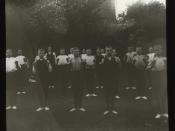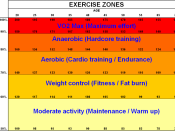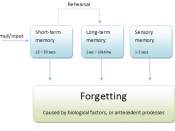Introduction
We all learn in Biology 12 that physical activity increases our cardiovascular fitness that increases cerebral oxygen consumption via blood vessels. Moss and Scholey (1996) demonstrated improvements in memory with increase in level of oxygen supply to the brain before learning by oxygen administration. One suggested mechanism was increase in cardiovascular fitness could improve our cognitive function. Hill, Storandt, and Malley (1993) reported some studies which examined the effect of short-term exercise of two to four months on cognitive function but were not able to find significant improvement in cognitive performance. It was suggested that their duration of exercise was not long enough to improve brain functions in order to maintain its performance. Therefore, Hill et al. (1993) conducted an experiment on the effect of long-term exercise on psychological functions including memory in older adults. However, the statistically significant group difference in the memory test was due to a drop in the average score of the memory test in the control group whereas no improvement was demonstrated in the experimental group.
Nevertheless, the deterioration of memory might due to the decrease of cerebral blood supply during aging in one-year time, as some studies reported by Moss et al. (1996) demonstrated a decrease in level of cerebral blood supply with age. On the other hand, the aerobic exercise might maintain the experimental group's memory and prevent the deterioration of their memory. To avoid this factor, young adults will serve as the subjects in the experiment, as their rate of memory deterioration, if there is any, will not be high enough to affect the result, and adjusted exercise duration of eight months will be used. Other than that, the subjects were not randomly assigned in the experiment of Hill et al. (1993)
The aim of this experiment and correlational research is...


